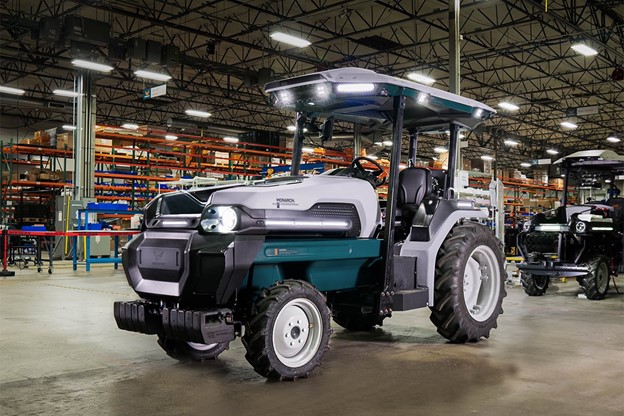Robots have rolled into action for sustainability in farms, lower energy in food delivery, efficiency in retail inventory, improved throughput in warehouses and just about everything in between — what’s not to love?
In addition to reshaping industries and helping people, robots play a role in the transition away from fossil fuels. The first commercially available electric tractors with autonomy also launched this year, packing AI to support more sustainable farming practices.
Meanwhile, startups worldwide are developing energy-efficient autonomy with NVIDIA Jetson AI that supports the planet.
Take a peek at some of the top robots of the year.
Monarch Tractor Plows New Path
Developers have been digging into agriculture technologies for the past several years, but Monarch Tractor in December released a revolutionary new electric tractor that checks a lot of boxes.
Monarch, based in Livermore, Calif., unveiled the first commercially available tractor with autonomy, which is compatible with computer vision-guided smart implements like precision sprayers for herbicides.
Using six NVIDIA Jetson Xavier NX system-on-modules, Monarch’s Founder Series MK-V tractors are essentially roving robots.
Farmers won’t get range anxiety with these either. The highly capable sustainable farming tractor can run all day on a charge. The NVIDIA Jetson platform provides energy-efficient computing to the MK-V, which offers advances in battery performance.
With plans to scale up production in 2023, Monarch’s debut marks a Tesla moment for tractors.
Cartken Puts Delivery Bots in Reach
Food delivery has been a hot ticket with consumers, driving mobile apps that deliver from restaurants. An offshoot of this, robot food delivery startups are assisting some of these companies.
Cartken, based in Oakland, Calif., is serving Grubhub and Starbucks deliveries with its robot. It’s among a growing pack of robots-as-a-service companies that harness NVIDIA Jetson for edge AI.
The startup relies on the Jetson AGX Orin module to run six cameras to support mapping and navigation as well as the complete sense, perceive and control stack.
Cartken joins the food party as startup Kiwibot is making a splash here, too. And Cartken has thousands of reservations for its on-demand robot service, according to the company.
Robot deliveries are poised to boom. Robotic last-mile delivery is expected to grow more than 9x to $670 million in revenue in 2030, up from $70 million in 2022, according to ABI Research.
Fraunhofer IML Aims at Warehouse Efficiencies
Robots, particularly autonomous mobile robots (AMRs), are playing a big role in creating supply chain efficiencies.
Like many working on robotics innovations — including BMW, Amazon and Siemens — German research firm Fraunhofer IML relies on the NVIDIA Omniverse platform for building and operating metaverse applications. It’s harnessing the platform to make advances in applied research in logistics for fulfillment and manufacturing.
Fraunhofer IML taps into the NVIDIA Isaac Sim application to make leaps in robot design with simulation. Fraunhofer’s O3dyn robot uses NVIDIA simulation and robotics technologies to create an indoor-outdoor AMR.
It aims to deliver fast-moving AMRs that aren’t yet available on the market.
Telexistence Deploying Hundreds of Restocking Bots
Lockdowns and labor shortages of the past few years put empty retail store shelves around the world in the spotlight.
Telexistence, based in Tokyo, recently announced plans to deploy NVIDIA AI-driven robots for restocking shelves at hundreds of FamilyMart convenience stores in Japan. They are also using the power of simulation with Isaac Sim so the developers are not left waiting to develop and debug the product.
The startup is helping to create efficiencies and keep shelves fresh by applying robots to repetitive tasks like beverage restocking. This frees up retail employees to handle more complex challenges, like customer service.
Next up, it plans to expand to U.S convenience stores.
Scythe Rolls Out Autonomous Lawn Mower
Scythe, based in Boulder, Colo., is taking reservations for its M.52 autonomous electric lawn mower.
The startup’s M.52 mower gathers data from eight cameras and more than a dozen sensors, processed by NVIDIA Jetson AGX Xavier edge AI computing modules.
Scythe plans to rent its machines to customers in a robots-as-as-service model, or RaaS, based on acreage of cut grass, reducing upfront costs.
It has more than 7,500 reservations for its on-demand robot service so far, according to the company.
The lawn robot company is a member of the NVIDIA Inception program for cutting-edge startups, as are Cartken and Monarch Tractor.
Learn more about the NVIDIA Isaac platform for robotics and apply to join NVIDIA Inception.
